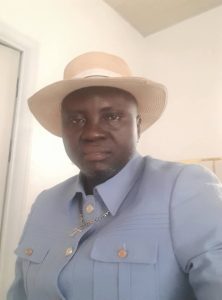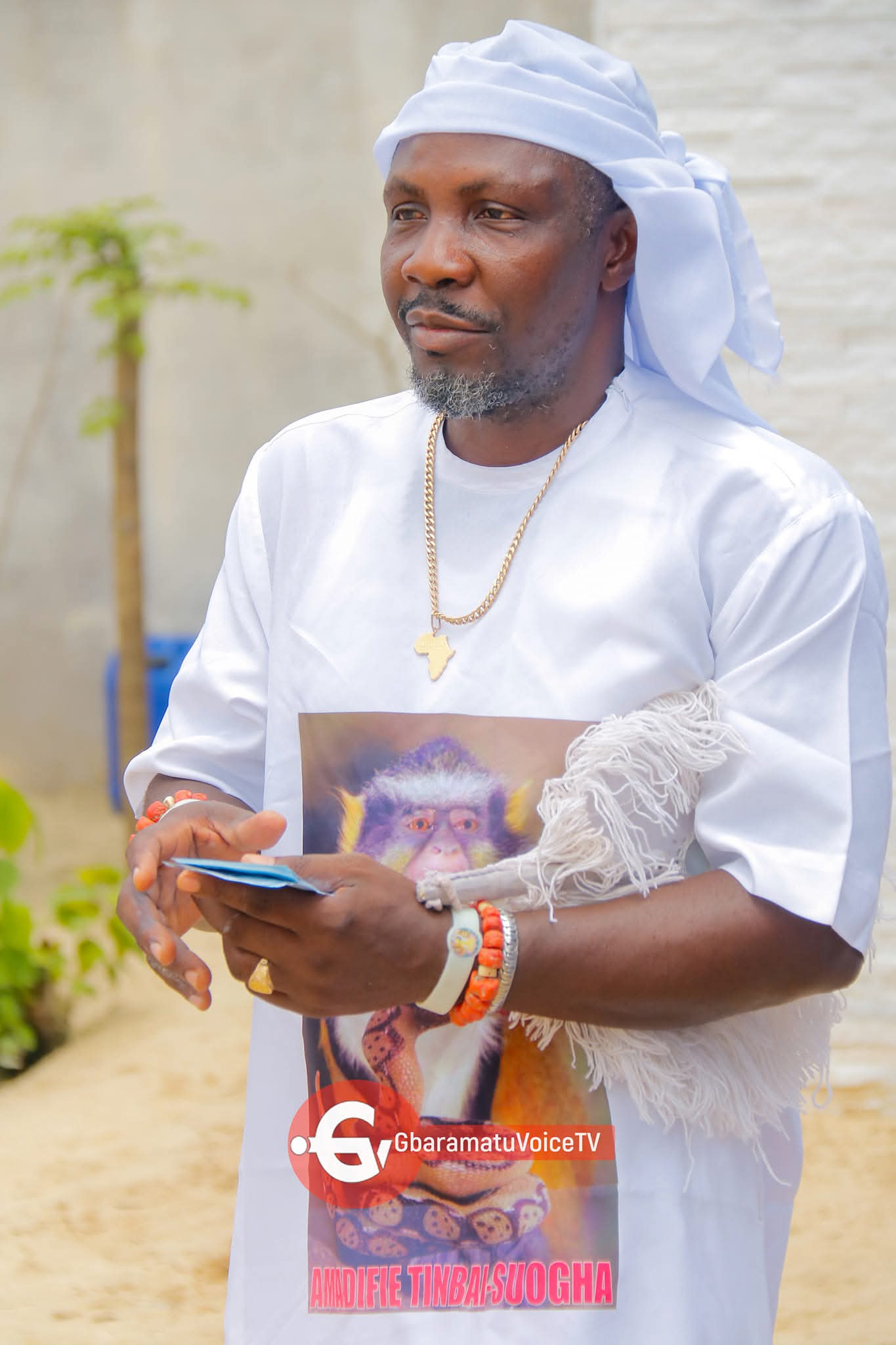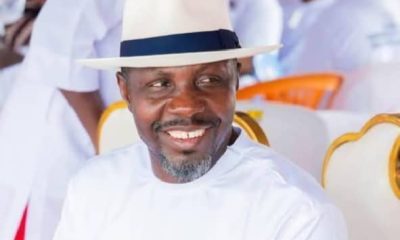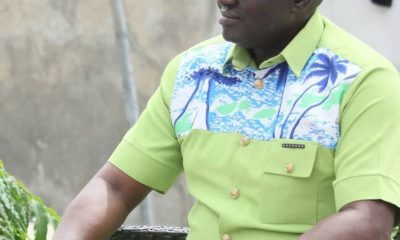Editorial
THE ODIMODI ODYSSEY OF SCHOLARLY DISTINCTION: CELEBRATING PROFESSOR CHRIS IKPORUKPO AND RECENT PROFESSORIAL PROMOTIONS; The Address that Broke all Records

Editorial
Prof. Benedict Ebimotimi Binebai, BA. (Hons). M.A, PhD, University of Ibadan., Msonta, Former Head, Department of Theatre Arts Niger Delta University; Current Orator, Niger Delta University; Voice of the Niger Delta, 2021. 2019 Recipient, African Solo Drama Award. He is one of the very few scholars in contemporary Nigeria who not only laid academic foundation for Niger Delta regional Drama through teaching, research and theorisation , but whose scholarship and creativity address the long history of environmental degradation in the Niger Delta through the medium of drama. Binebai is Niger Delta University 55TH Inaugural lecturer. His inaugural lecture is titled, The Theory and Drama of the Silent Space. He is theorist of the speaking Space and Heroes on the Margins. A Multiple Award Winner in Drama and Theatre. A Playwright, Literary Critic, a Subaltern Postcolonial Scholar, Public Affairs Analyst. Governing Council Member, Delta State University of Science and Technology, Ozoro. A Professor of Drama, Dramatic Theory and Criticism, Niger Delta University, Bayelsa State, Nigeria.
This knee-jecking oratorical idol once again broke all known records with his mind-blowing Keynote Address on the occasion of the Grand Reception Ceremony organized by Odimodi Community for her top academic brass.
Read the breathtaking piece.
“Today, as the ancient rivers and land of Iduwini whisper the mission of this gathering to the wind, and the majestic mangrove trees stand sentinel over the land of Odimodi, I stand before you on the prompting of fate, as a true son of the soil, with humility, deep sense of celebration and grace to speak here. But who am I to speak in a grand reception held in honour of our legendary academic, if not for the invitation of the organisers of this grand reception? As I reflect on my academic journey, I am reminded of the day I stepped into the hallowed institution, University of Ibadan, filled with dreams and aspirations. And it was on that day, I first met Professor Chris Ikporukpo at Preboye’s world, Agbowo, Ibadan. His warm smile and temperate academic mien put me at ease. As I recall that historic moment, I remember not just his words, but his nonverbal gestures. The spread of warm smile across his face, his nod of endorsement and the firm but gentle affirmative wave of his hand communicated his reception of my studentship, it is as if he was saying, “welcome to University of Ibadan and I am committed to helping you succeed”. That was 30 years ago. Here we are, father and son as professors. We give God the glory. Our father, the subject of our gathering today is an institution of inspiration and academic productivity.Odimodi, an ancient home where the great river of Iduwini and the waters from heaven nourish the fertile plains, is one of the fastest growing communities, in size and population, located in the northern fringes of Burutu local government. It is an enchanted land and home to a people whose love for knowledge has woven a spell of wisdom and prosperity around them. Its founder, Otolor-Kokioko popularly known as Eluwe, was a wise, courageous and adventurous man who left legacy knowledge for his descendant. This is a community dedicated to the pursuit of knowledge and the dissemination of wisdom, where children are engrossed in a world of knowledge and wonder. It is a community that celebrates education. We need to applaud our progenitors and their progenies for this divine blessing.The Odimodi dedication to education seems to have been influenced partly by the examples of other education-loving societies around the world. The Jewish community has a long history of valuing education which contributed to their achievements in Science, Technology, “Entrepreneurship, and Art, the Indian diaspora in the United States developed a strong commitment to education, the Singaporean society also placed emphasises on education because it is the driver of economic transformation, Finland, South Korea, the ancient Greek- city state and the Scottish enlightenments also place high value on education. These are examples of nation in the world that have experienced the transformative power of education in shaping the development of their societies and civilisations. In Nigeria, the love for education has long produced the Yoruba, Ibo and Hausa nations as dominant forces and voices.
“Ladies and gentlemen, like the ageless River of Iduwini, education flows eternally, connecting past, present and the future and shaping the minds of those who drink from the waters. Permit me to visit the past to acknowledge the contributions of tutors of Odimodi ancestry to the educational development of Ijaw and the Nigerian nation at Burutu. For decades these tutors: the late legendary Mr. Smart Oka and S.M.B Bibaikefie, mathematics and physics tutors, Dickson Ikporukpo Geography tutor and administrator, late Michael Ingo Music, late Idumu Seikorowei, Late Clark Oka, a Student Tutor, Late V.C.M Isiayei, late Tima Iyalagha, Henchard Erezene and Hon.Dennis Yeinbiri Bibaikefie, a tutor of Chemistry and Physics. These array of tutors showed their unflinching commitment to empowering younger generations of Nigerians including Ijaw youths through education. In an occasion of this magnitude, it is necessary to recognise and appreciate their selfless work as educators. Some of these educators or their children are the ones we are celebrating today as professors. Interestingly, most of the honorees had their educational foundation at Eluwe Primary School Odimodi. Let it be known that the Odimodi example of educational excellence is based on, Student and Teacher-centric, institutional, society and environmental factors. These factors interweave to construct a robust drapery of support to the academic success of the Odimodi consumer of knowledge.In 2019, when my senior brother, Henchard Erezene and I were announced as Professors by the Governing Council of Niger Delta University, the entire Iduwini gathered at Burutu with Odimodi taking the lead to celebrate my thanksgiving in which the former and late Vice-Chancellor of Niger Delta University, Professor Samuel Akpoebi Gowon Edoumiekumo, attended. Remarkably, I received another reception ceremony from the youths of Odimodi on the 29th of December 2019. A memory that remains vivid and indelible in my mind.Here we are again, in a most fitting manner, to honour a big academic masquerade, an intellectual Abadejongo, a grand master, a titan, a supreme geographer of geography, a prophet and a sage of the environmental science and a space occupying sheriff of knowledge. As you can see, the serene and bright weather indicates that the ancestors and gods of our great land of Iduwini smile upon us as we celebrate the retirement of Professor Chris Ikporukpo and the reception of our new professors. It is only in the fertile soil of knowledge that the seeds of greatness are planted and the harvest of progress and prosperity are reaped. Evidently, Odimodi has an impressive history of nurturing its educated sons and daughters in Ijawland.
“On behalf of the Chairman, Chiefs, elders and good people of Odimodi community, I extend my warmest congratulations to Professor Chris O. Ikporukpo, former Vice- Chancellor of Niger Delta University, Wilberforce Island, Bayelsa State, on his retirement after his meritorious service to the University of Ibadan in particular, and the global academic community for 43 years. It is an honour to attend school, and even a greater honour to become a professor, but it is a supreme honour to become a vice –chancellor – head of academics and administration- a professor of professors and most importantly, to inspire education and scholarship in society. It is a joyous spectacle to retire successfully and gloriously. Not many can cross the river Prof Chris Ogolo Ikporukpo has crossed.The educational history of Odimodi is made visible and prominent by several professionals, such as Healthcare professionals, Education professionals, justice and law enforcement professionals, Business and finance professionals, skilled trades, technology and IT, arts and entertainment Professionals, Government and Public Service professionals, architects and engineers. But from the dawn of the Odimodi educational Odyssey, teaching and the law professions are linked. Thus, it is expedient to honour the late Chief Barrister Ernest Ikime Iseru, a pre-independent lawyer, who himself was a trained grade one teacher, a head teacher at the Native Authority School, Okrika and later went to Northern Nigeria where he taught at a college, he proceeded to the United Kingdom to study law between 1955 and 1958. He returned to Warri as the most senior lawyer in the then Warri province. He made history as the first lawyer from Western Ijaw Division, preceding Chief Edwin Kiagbodo Clark, and Broderick Bozimo. What is more, his legacy lives on through two of his children and ground children who followed his footsteps in the field of law. His first daughter, Anne, the queen of Professor Chris Ikporukpo’s dynasty, a 2011 Doctor of philosophy holder from University of Ibadan, whose daughter is a lecturer of law at University of Lagos, soon to earn a PhD in law, thus, going beyond her models. You can see that Professor Ikporukpo’s home is an educational confluence powered by the teaching and the legal professions. Barrister Ernest .K. Iseru was a great teacher and lawyer. The law foundation laid by Barrister Ernest. K Iseru has since attracted a legion of legal experts in Odimodi like Barrister Sam Ikporukpo, Austine Igbapike and his granddaughter, a teacher of law.My warmest posthumous congratulations to a profound scholar of mathematics, our own Richard Ogoja Angiama of the University of East London, with broad knowledge and expertise in academic fields such as applied economics, marketing and Industrial Administration. A trailblazer who ignited a passion for scholarship, a pillar of inspiration in the pursuit of knowledge. Let us also welcome Henchard Bibi Erezene, a scholar who has over 50 local and international publications, a member of several learned academic societies and Associations including the historical society of Nigeria. Professor Henchard Bibi Erezene is the Chairman, Ijaw National Congress(INC) National Committee on Environment and Biodiversity, and a member of the Board of Governors(BOG) of the Assemblies of God Nigeria Pentecostal Theological Seminary at Eleme, Port Harcourt, A Professor of African History, first Professor of History in Western Ijaw and former Head, Department of History and Diplomacy, Faculty of Arts, Niger Delta University, Jude Iyabrade Ikporukpo, from the Ikporukpo natal and academic dynasty, a university Administrator, a highly effective leader and scholar with impressive national and international publications. A Professor of Development Studies in Political Science and former Head, Department of Political Science. Let us also welcome Dr. Bryan Oweilayefa S. Gere, a PhD Holder in Rehabilitation Services from the Southern Illinois University Carbondale, a recipient of academic awards, an author of several book chapters, journal articles and a principal and co-investigator on some competitive grants. He is a member of The National Council on Rehabilitation Education (NCRE) and the American Counselling Association (ACA). An Associate Professor of Rehabilitation Services, University of Maryland, Eastern Shores, USA. As we celebrate their remarkable career, we recall the wisdom of Aristotle, who said, “We are what we repeatedly do. Excellence is not an act, but a habit. Their career has been a rich tapestry from threads of dedication, expertise and compassion. They are great sons of Odimodi who unlocked the treasure chest of knowledge and discovered earlier, that education is a heroic quest for self-discovery, overcoming challenges and emerging victorious.Professor Chris Ikporukpo walked through the iconic gate and attended the University of Ibadan in 1970, full of dreams powered by a heart of curiosity. He earned a degree in Geography in 1973. The eagle sees clearly and properly only when it flies higher. The courage to reach greater heights is an inner energy of vision. Following his National Youth Service, he returned to the University of Ibadan on scholarship to pursue his doctoral research, skipping the master’s degree and earning his PhD in 1977.Chris Ikporukpo rose rapidly through the academic ranks, becoming a substantive professor of Transport/Industrial Geography on October 1, 1991. Between 2008 and 2010, he served as a member of the Governing Board of the Joint Admissions and Matriculation Board. Professor Chris Ikporukpo was appointed Vice- Chancellor of Niger Delta University, Wilberforce, Island Bayelsa State, in 2005 by His Excellency, late Chief Dr. Diepreye Solomon Peters Alamieyeseigha, a position he held until 2012. Chris Ikporukpo is a Fellow of the Association of Nigerian Geography. An earlier teacher of Professor Idowu Olayinka, who was the Vice-Chancellor, University of Ibadan, when he retired in 2020.He served as Dean, Faculty of Social Sciences, and after his Vice-Chancellorship at NDU, he accepted leadership role as Head of the Department of Geography. An acceptance characterised by humility, profound commitment and strong sense of allegiance to the academe. Prof Chris Ikporukpo published in peer reviewed papers and a number of high impact national and international journals. He has been published in a variety of subjects, within the disciplines of geography and science, a distinguished academic that journeys along the coast of environmental studies and urban planning within Nigeria and the African landscapes. His scholarship is a merger of thoughts from urban development, environmental policy, geography and environmental science. His research dovetails into social and economic dimensions of natural resource management, urbanisation and environmental change issues and the complex relationship between human and natural systems. He has taken scholarship to urban development in the Lake Chad and the evaluation of urban green infrastructure in Ethiopia. Professor Chris Ikporukpo’s scholarship has addressed topical subjects such as land use change, oil resource management and the interlock of federalism and economic power in Nigeria, and without doubt his intellectual radar also captures the challenges of urban mass transit and rural transportation. Remarkably, our honoree has collaborated with researchers and institutions from around the world, displaying a robust research capacity across cultural and geographical frontiers. He has received sponsorship from great institutions such as the Deanship of scientific research at Kings Khalid University and the Ministry of Science and Technology in Taiwan. Chris Ikporukpo has researched on environmental planning and management in the Nigerian context and the development of innovative frameworks and models for analyzing and addressing environmental challenges in the Niger Delta. He possesses a repository of knowledge and his works have been extensively studied, deeply recognized and broadly cited in the fields of geography and environmental science. “Professor Chris Ikporukpo has supervised many graduate students, helping to build capacity in geography and environmental science. He gave his inaugural lecture, titled “Spatial Engineering and Accessibility, 2002 at the University of Ibadan, from the Faculty of Social sciences. A lecture predicated on design and implementation of systems, products and environments that are accessible, usable and safe for everyone. A first-rate utility lecture. Today, we are gathered in a colourful way to celebrate a luminary whose radiant intellect and generosity of spirit have illuminated the lives of countless students, a man with the shoulder of a giant whose academic prowess and pedagogical passion have inspired generations, we celebrate the retirement of this great father, mentor, and academic hero-general, the Funpere and Fun Agele Sibewei of Iduwini, Professor Ikporukpo, and the recent promotion of three other academics of Odimodi to the professorial cadre.The noble Odimodi Community of Iduwini kingdom is one of the highest producers of professors and other academics in Burutu local Government area. Only a community that knows the value and power of education can achieve this feat.
Professor Chris Ikporukpo is known for his frank and sociable personality within and outside the university environment. If you want him to listen to you, be reasonable, show preparedness and capacity for what you want him to do for you. Make no foolish and impossible requests from him. Many would think he is a difficult man, but he is not difficult. He is only principled. He appreciates family, friends, and well-wishers. He is one man who wants the best for his society.The academic veteran, Chis Ikporukpo, when he was a university administrator, projected a heart decorated and populated with university transformation and sophistication. During his tenure as Vice-Chancellor at Niger Delta University, he caused an educational revolution. The quality of lecturers at the time was very poor. The university was populated with junior faculty members or Assistant lecturers. To change the narrative, Professor Chris Ikporukpo gave an order to lecturers without PhDs to enroll in PhD programs at accredited universities to further their academic careers. As at the time he was leaving as Vice-Chancellor, the university recorded over three hundred PhD holders. It was during his tenure that the university started producing professors, associate professors, and senior lecturers.Today, the Niger Delta University is a self-governing institution known nationally as the Most Efficient University in Nigeria during the recent reign of the late Vice-Chancellor, Professor Samuel Gowon Edoumiekumo. A foundation laid by Professor Chris Ikporukpo and Professor Humphrey Anthony Ogoni who succeeded him as Vice-Chancellor.We gathered deliberately to celebrate because the academic and intellectual tidal muses of Iduwini vibrate melodiously in harmony, from the distant past and the heroes have emerged, with hearts forged in the crucible of curiosity, ablaze with an unquenchable thirst for knowledge and excellence. They descended, armed with the armour of wisdom and the spear of innovation, driven by the fire of their passion, they embarked on their epic quest, conquering the realms of knowledge and emerging victorious. “Today, the professors we celebrate appear as guardians of the sacred flames of knowledge and excellence in their various fields of pedagogy and erudition. They have transcended their fields by making significant contributions to the broader social and cultural landscapes. They are important for the advancement of knowledge in Odimodi, Iduwini, and the wider Ijaw setting by promoting social justice and advancing the well-being of humanity. The achievements of Professor Chris Ikporukpo and the professors of honour today, attest to the fact that excellence is achievable, innovation is possible, and learning is a life-long journey.A majestic and venerable great and aging tree may slow its growth, but its roots remain to nourish the soil for future generations. Professor Chris Ikporukpo’s legacy will continue to inspire and nurture our academic community. Our father, our mentor and “mega academic hero”, is a confluence of intellectual merit and activism and a transporter of rising scholars finding voices. His Ikporukpo-centric rationalization and academic attributes have helped to build a fertile tide of intellectuals within Odimodi, Iduwini, Ijaw land in the Nigerian academic estate and the global arena. He represents a historical”
Editorial
Is Dubai A Country? Inside the Seven Kingdoms of the United Arab Emirates

By: Editorial Team
The United Arab Emirates (UAE), often hailed as a beacon of modern development in the Middle East, is a federation of seven emirates—each with its own distinct history, ruler, and cultural identity. Since its unification in 1971, the UAE has stood as a rare example of how traditional monarchies can collaborate to build a stable and globally respected nation.
At the heart of the federation lies Abu Dhabi, the capital and largest emirate, known for its vast oil wealth and political influence. The Al Nahyan family, which leads Abu Dhabi, has played a central role in shaping the UAE’s national vision and foreign policy. The current President of the UAE traditionally comes from this emirate, underscoring its leadership within the union.
Dubai, the shining star of the federation, represents ambition and innovation. Under the leadership of the Al Maktoum family, Dubai has transformed from a desert outpost into a global hub for finance, tourism, and technology. Its breathtaking skyline, led by the Burj Khalifa, has become a symbol of Arab progress and resilience.
Moving beyond the two powerhouses, Sharjah distinguishes itself as the cultural and educational capital of the UAE. Led by the Al Qasimi family, it has preserved the emirates’ artistic heritage while promoting academic excellence through its numerous universities and museums.
The smaller emirates-Ajman, Umm Al-Quwain, Ras Al Khaimah, and Fujairah-each add unique character and strength to the federation. Ajman, the smallest, thrives on trade and manufacturing; Umm Al-Quwain offers a peaceful charm along its quiet shores; Ras Al Khaimah, nestled against the Hajar Mountains, is known for its natural beauty and growing industrial base; and Fujairah, facing the Gulf of Oman, plays a strategic maritime role in the region’s economy.
Despite their differences in size and resources, the seven emirates remain bound by shared values, mutual respect, and visionary leadership.Their collective success story reflects not only unity but also the ability to balance tradition with progress.
Over five decades after its founding, the UAE continues to prove that cooperation among monarchies can yield a modern, forward-looking state-one that honors its past while boldly stepping into the future. The federation’s model of governance offers an enduring lesson in leadership, stability, and nation-building in a region often defined by division.
Photo Credit: shuterstock
Editorial
The Modern Avatar of Agadagba

Editorial – IduwiniVoice
Government Oweizide Ekemupolo is 4th Century descendant of The progenitors of the Oru tribe, the archetypal Ijaws, who settled in the central Niger Delta and over time, who developed and spread to the entire Niger Delta. He his an embodiment of the ancient and modern ways and forces of the ijaw ancestral greats, ruled my ancient spiritual and human laws, a man and a superman.
Prior to 1600 AD, the Ijaws first and formally formed city-states on their island of abode in Central Niger Delta. The city-states were named Agadagba-bou, Isomou-bou, and Opugla-bou. The popular city-state was called Agadagba-bou, which, according to history, flourished for 400 years until it got abandoned in 1050 CE. That was the period Ijaw people migrated within the central Niger Delta and spread to the Western and Eastern Niger Delta.
Agadagba-bou, Isomou-bou, and Upugla-bou, which represented the Ijaw civilization at the historical island, long before it was named Wilberforce Island, had cultural, spiritual, linguistic, and occupational homogeneity.
They were all worshippers and believers of the sky God. The sky God that the Ijaws call today, even from ancient times, is Egbesu. It is believed that the Wilberforce Island was known as a forest named after Agadagba, the most powerful chief priest of Egbesu, who also doubled as the military general of the Izon nation.
Agadagba-bou, as a nomenclature, derives its bearing from Agadagba, the chief priest and generalissimo who once reigned on the Wilberforce Island. It is certain that the island hosted the Ijaw nation long before the time of Agadagba because Agadagba was appointed a chief priest and military general during his time by a potentate ruler of Ijaw nation.
In the primordial mists of time, Agadagba, the illustrious military general and chief priest of Egbesu, strode forth from the hallowed grounds of Agadagbabou, his footsteps echoing through the annals of Ijaw history. This revered figure, a paragon of martial prowess and spiritual wisdom, embodied the dual essence of his people, wielding the sword and the sacred staff with equal aplomb. The whispers of the ancients tell us that Agadagba’s reign predated the 1600 AD, a bygone era when the Ijaw nation thrived in harmony with the rhythms of the Niger Delta.
Agadagbabou, the cradle of Ijaw civilization, slumbers beneath the weight of centuries, its sacred soil serving as the final resting place of the ancestral spirits. Here, the venerable dead lie entombed, their ethereal essences lingering, awaiting the supplications of their descendants. Alas, the diaspora of the Ijaw people has occasioned a lamentable disconnection from these archetypal forebears, a severance that has hindered the unfettered flow of ancestral blessings, those numinous benedictions that are the birthright of every society.
For it is an immutable truth that the progress of a people is inextricably linked to the approbation of their ancestors.
The epochs have passed, and Agadagba’s terrestrial sojourn has long since drawn to a close, yet the imperishable essence of this legendary figure endures, awaiting reification in the mortal coil. Behold, 4.18 CENTURIES AFTER AGADAGBA, PRICESELY FOUR CENTURIES PLUS, in this our age, Government Oweizide Ekemupolo, a worthy scion of the Ijaw nation, has arisen, invested with the sacred mantle of Egbesu’s chief priest and military general. The symmetries are striking, the correspondences unmistakable: Ekpemupolo stands forth as the avatar of Agadagba, a reincarnation of the primordial hero, reborn to reclaim the lost patrimony of his people.
As we gaze upon Ekpemupolo, we behold the rekindled flame of Agadagba’s indomitable spirit, a fiery essence that refuses to be extinguished. The mythopoeic imagination whispers secrets in our ear, intimating that this modern-day embodiment of Ijaw valour and spirituality is, in truth, a Priest of the ancient mysteries, a hieratic vessel ordained to restore the pristine glory of Agadagbabou and reestablish the vital link between the living and the ancestral dead.
Thus, the epicycle of time turns full circle, as the reincarnated Agadagba, in the person of Ekpemupolo, strides forth to reclaim his rightful place within the sacred precincts of Ijaw tradition. The word is a witness to his spiritual and endeavours which catalyse a renaissance of the Ijaw spirit, rekindling the ancestral fires that burn bright within the collective unconscious of this venerable people, and guiding them toward a future illuminated by the radiant glow of their archetypal forebears.
As Tompolo’s efforts continue to bear fruit, Nigeria’s economic landscape is transformed, and the nation’s people reap the benefits of his tireless endeavours. His legacy will forever be etched in the annals of Nigerian history, a shining testament to the power of visionary leadership and unwavering dedication to the nation’s progress.
Benedict Binebai is a Professor of African Literature, a Social Conscientizer, and a Critic of outstanding repute.
(c) IduwiniVoice
Editorial
A Magnificent Gesture of Philanthropy: Tompolo’s Landmark Donation 10 Billion Naira to Delta State Government

Editorial
Chief Tompolo’s most generous bestowal of 10 billion naira upon the Delta State Security Fund is a magnificent affirmation of his steadfast devotion to the betterment of his beloved homeland. This munificent act not only underscores his profound solicitude for the well-being of the citizenry, but also serves as a sonorous confirmation of his dedication to the edification of the nation.
This magnificent donation bespeaks Chief Tompolo’s perspicacious vision for a Delta State wherein the territorial integrity, individual safety, and proprietary rights of its inhabitants are zealously safeguarded and protected. For it is an immutable truth that security constitutes a fundamental pillar for peaceful and progressive human existence, and a people that get security right are a people who enjoy prosperity, stability, and tranquillity. His largesse constitutes a clarion call to all right-thinking Nigerians to emulate his exemplary conduct, thereby contributing to the realisation of a more stable and prosperous nation.
As a private individual, Chief Tompolo’s remarkable munificence distinguishes him as a true architect of society, a philanthropist of discerning taste, and a stalwart champion of both private and public institutions. His actions evince a profound comprehension of the intricate nexus between security, patriotism, and nation-building, and serve as a shining exemplar for others to follow.
In the pantheon of benevolent figures, Chief Tompolo’s deed resonates with the selfless generosity of mythical beings like Prometheus, who defied the gods to bestow the gift of fire upon humanity, or Hercules, who cleansed the Augean stables to bring prosperity to the land. Like these fabled heroes, Chief Tompolo’s philanthropy emanates a profound sense of altruism, illuminating the path towards a brighter future for the people of Delta State.
By this singular act, Chief Tompolo has floated a most compelling narrative that the Ijaw nation, and indeed all ethnic groups in Nigeria, have a critical role to play in shaping the country’s destiny. His donation is a puissant statement that the resources and talents of Nigerians, regardless of their region or ethnicity, can be harnessed to forge a more united, secure, and prosperous nation, and that the Ijaw people, in particular, are committed to contributing to the construction of a brighter Nigerian picture.
Chief Tompolo’s unprecedented gesture inaugurates a new paradigm of leadership for the Ijaw nation, one that radiates an unparalleled aura of generosity, vision, and selflessness. This luminous exemplar of leadership kindles a guiding light, illuminating a path towards a more prosperous, equitable, and enlightened future for the Ijaw people, and serves as a resplendent model for leaders across Nigeria and beyond, demonstrating that true greatness is measured by the ability to uplift and empower one’s community.
Benedict Binebai is a Professor of African Literature, Public Speaker, and a renowned critic of intellectual acclaim.
(c) IduwiniVoice




